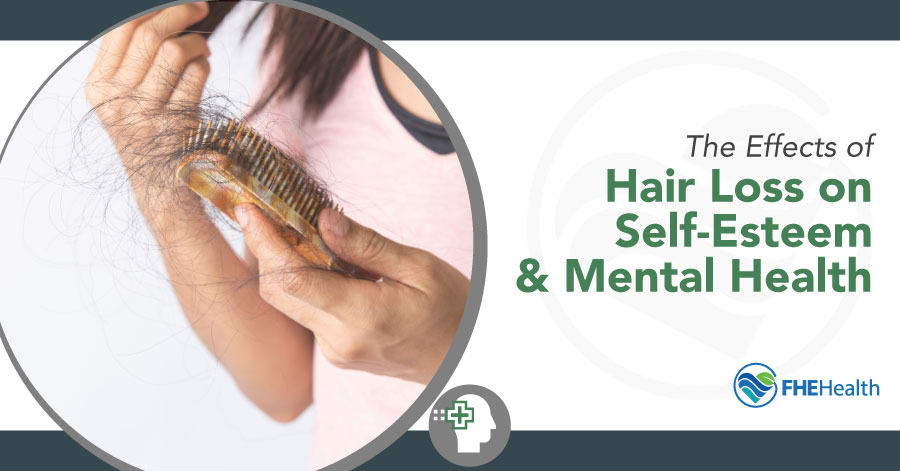
If you’ve ever brushed your hair and had to do quite a bit of cleanup afterward or been shocked at how much hair is in the drain after wash day, you probably already know how it feels to deal with hair loss. Hair loss, formally known as alopecia, can happen for a variety of reasons, including age, hormonal imbalances, high stress levels and untreated medical conditions.
Regardless of the cause, hair loss can have a real effect on your self-confidence and mental health. Learn more about the connection between appearance and mental health and what you can do if you’re experiencing alopecia depression.
Why Is Appearance Important to Our Mental Health?
For many people, whether it’s how they were raised or just cultural expectations, appearance is intrinsically tied to their mental health and how they feel about themselves. Both women and men often believe some of their value is tied up in how they look or how they fit into the social expectations for appearance, and there’s a constant bombardment of anti-aging messages and how we’re all supposed to look youthful — apparently forever — every time someone opens their phone or watches TV.
When you experience sudden or early hair loss, it can have a negative effect on your self-confidence and self-esteem because it’s portrayed as a bad thing or something to be fixed or covered up by society. Even if the hair loss is due to the inevitable and natural effects of aging, it can still be very distressing to deal with. And if you’re experiencing anxiety or depression related to hair loss, it can have a compounding effect on your mental health, causing you to attend fewer social functions and be less connected in relationships because of not wanting people to see or know about your hair loss.
How Does Mental Health Impact Hair Loss?
Just as your physical appearance can impact your mental health, the reverse is also true. While we tend to think of physical symptoms being produced only by physical illnesses, your mental health can actually have a very strong effect on your physical body. Those struggling with mental health may experience physical signs and symptoms such as:
- Digestive issues
- Poor sleep
- Fatigue
- Increased allergic response, such as to environmental allergens or an increase in food sensitivities
- Depressed immune system, which can increase the frequency, duration and intensity of illnesses
- Dry skin
- Weak fingernails
- Hair loss
- Nausea and changes in appetite
- Heart palpitations
- Sweating
- Shallow breathing
- Panic attacks
Anxiety, depression and chronic stress are three of the main mental health problems that are often the culprits behind physical ailments that can’t be explained by an illness or medical condition. And unfortunately, it can be a nasty cycle.
Consider the following example: You experience hair loss as a result of a hormonal imbalance or a period of high stress. This causes anxiety, alopecia depression and even more stress — which causes even more hair loss. And this cycle can repeat indefinitely.
How To Address Hair Loss and Alopecia Depression
So, we’ve established that hair loss can affect your mental health and that your mental — and physical — health can contribute to hair loss. This might seem like a bit of a catch-22, but the good news is that there are some things you can do to help break the cycle and start improving your mental health — and hopefully your hair health as well.
The first thing to do when you notice abnormal amounts of hair loss is talk to your doctor. Hair loss can be a common sign of some underlying medical conditions, such as hypothyroidism and hormonal imbalances. If your doctor can pinpoint a medical issue as the cause of the hair loss, they may be able to get you started on a treatment that can help you retain and regrow your hair.
If you’ve ruled out a medical condition, it’s time to start looking at potential lifestyle factors. As discussed earlier, high stress levels are one of the leading causes of hair loss that’s otherwise unexplained. And with today’s society being more concerned with constant hustle and less with relaxation and restoration, just keeping up with daily life and work and family obligations can be enough stress to take a toll on your hair.
If you think stress may be a factor in your hair loss, you can start creating positive change slowly. Look at your schedule and see if there are any obligations you can let go of for now. Consider creating a morning and evening routine that helps you get centered before the day begins and get into a relaxed state before you go to bed. You may also want to learn more about meditation or take up a relaxing hobby like walking in nature or knitting.
Lastly, it’s important to look at nutrition. What you eat and drink can have a direct effect on your skin and hair health. Make sure you’re consuming plenty of fruits and vegetables, protein and healthy fats, and avoid processed food and excess sugar, which can cause inflammation and hormonal imbalances that can cause or contribute to hair loss.
Keep in mind that hair loss might be inevitable, especially when it comes to the aging process. Extensions and wigs are options that can help boost your self-confidence, but it’s also important to remember that you’re far more than your hair or any aspect of your appearance. Acknowledging the depression and even grief that can come with hair loss and learning to accept and love yourself just as you are today is an important part of moving forward.
If you’re concerned that your hair loss is affecting your mental health or that you may be dealing with alopecia depression, you can reach out to our team at FHE Health.






